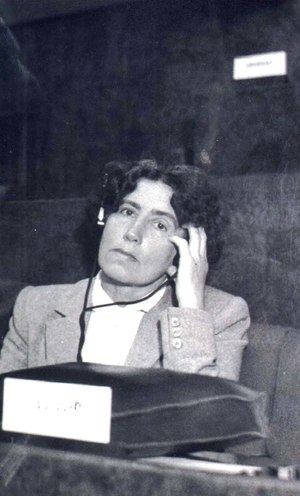
Unternavigation
Margarita Schwarz-Gagg
Margarita Schwarz-Gagg (1899–1989) was one of the first female experts on the welfare state in Switzerland. As a social scientist and a member of numerous official commissions, she played a leading role in the introduction of maternity insurance and improving conditions for gainfully employed women. Schwarz-Gagg also represented Switzerland at the International Labour Conference for several decades.
Margarita Gagg earned her doctorate in 1924 – the second woman to do so – in national economy at the University of Bern. She first addressed the protection of female workers in her dissertation. After her marriage, she authored and co-authored various scientific studies, exploring the cottage industry (Heimarbeit) in Switzerland. She published the book ‘Women in Swiss Industry’ in 1928 for the first Swiss Exhibition on Women’s Work (SAFFA). Furthermore, she was involved in the legislative commission of the Union of Swiss Women’s Associations. Between 1931 and 1965 she was the first and only woman on the Federal Factory Commission. In 1937, Schwarz-Gagg conducted an extensive survey on the protection of young mothers in Switzerland on behalf of the Swiss Association for Social Policy with the support of the Federal Social Insurance Office and the Federal Office for Industry, Trade and Labour as well as the Federal Statistical Office. The survey revealed that only half of all new mothers received daily sickness allowances in the mid-1930s. There were also gaps in cover in nursing and care, particularly for reimbursing the costs of midwives. Women from the working class in particular were compelled to stop working shortly before giving birth and resume work immediately once the statutory rest period had lapsed.
Although she had family commitments and was not working full-time, Schwarz-Gagg was a member of the government delegation to the International Labour Conference between 1945 and 1960. Her expertise was also sought after on various federal expert commissions as well as the AHV commission. She particularly made a name for herself as a member of the commission tasked with drafting a maternity insurance project, which was integrated into the expert commission for the revision of the Health and Accident Insurance Act in 1948. Her commitment to improving the situation of expectant mothers earned her the moniker ‘mother of maternity insurance’. Once her children had grown up, Schwarz-Gagg resumed her career on a full-time basis. Between 1955 and 1967, she led the Swiss Central Office for Cottage Industry and was thus involved in a field in which she had proven expertise. The main tasks pursued by the Central Office included tackling economic plight in alpine regions. After her retirement, Schwarz-Gagg received the Adelaide Ristori Award from the Centro Culturale Italiano for her accomplishments in improving the social conditions and situation of employed women.
Literatur / Bibliographie / Bibliografia / References: Mantilleri Brigitte, Hervé Florence (2004), Histoires et visages de femmes, Yens sur Morges; Wecker Regina, Studer Brigitte, Sutter (2001), Die „schutzbedürftige Frau“. Zur Konstruktion von Geschlecht durch Mutterschaftsversicherung, Nachtarbeitsverbot und Sonderschutzgesetzgebung, Zürich; Rogger Franziska (1999), Der Doktorhut im Besenschrank. Das abenteuerliche Leben der ersten Studentinnen – am Beispiel der Universität Bern, Bern.
(12/2014)




